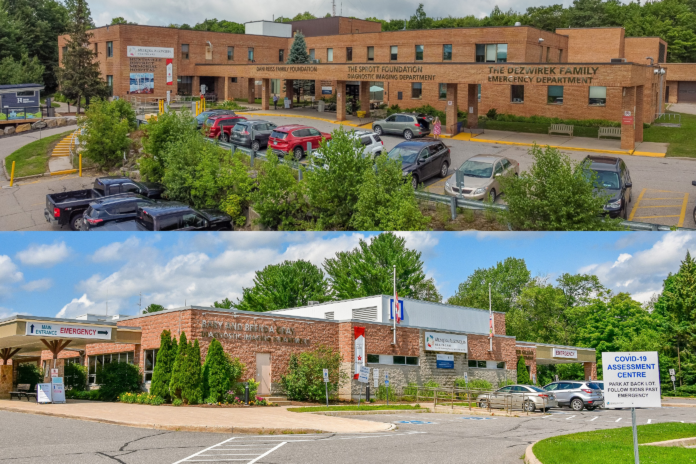A discussion at the recent Health Services committee ended with a $77.3-million district commitment to Muskoka’s two new hospitals, as well as a tax increase in 2024 to support it.
With the tax bump, a property assessed at $300,000 would pay about $4.29 more per year. The commitment towards the $225-million local share and tax increase will both have to be approved by District Council next month.
Julie Stevens, District CAO, told committee the commitment would mean about 96 per cent of the local share is accounted for—around $30.5-million is already committed by Huntsville, Bracebridge, and municipalities in East Parry Sound, $70-million from Muskoka’s two hospital foundations, and about $38.2-million from Muskoka Algonquin Healthcare (MAHC) itself.
Several councillors in West Muskoka, including some that do not sit on the Health Services committee, raised concerns about contributing to a local share for hospitals their constituents will not be able to use.
“I have to speak up for my municipality,” said Muskoka Lakes councillor Ruth Nishikawa. “This report about is about [the] Highway 11 corridor, it does not address East Muskoka at all. I will not have the ability to get to Huntsville. I don’t even have the ability to get to Bracebridge quite honestly. We use Orillia. That is our fastest route, and many people in my area as well as up the 169 [and 141], they use Parry Sound.”
Brian Bochek, Georgian Bay councillor, agreed noting he does not know a single resident in his area that goes to a hospital other than Georgian Bay General Hospital in Midland. He added some concessions would need to be made for the smaller townships.
Peter Koetsier, Mayor of Georgian Bay, who does not sit on the committee, says of all the closest hospitals to the Georgian Bay coast, Bracebridge is the fifth option for paramedics after Midland, Orillia, Barrie, and Parry Sound. He noted that of roughly $5.75-million in a district fund for hospital care, only $15,000 went to Midland’s hospital.
“One quarter of one per cent for eight per cent of the population [and] financial contribution. Frankly, that’s not fair,” said Koetsier. “If we’re going to be fair to our residents, if we’re going to collect hospital tax from them, they should be able to allocate it to a hospital they’re going to use.”
Moreen Miller, MAHC’s Board Chair, told council the agency needs to submit the next stage of planning to the province, complete with local share commitments, by January of 2024. She said the project has been added to Infrastructure Ontario’s list for 2027, and not acting now could scrap it indefinitely.
“If we are unable to determine and develop our local share contribution and structure to go with our stage 1.3, we will come off the list and the project will not move ahead,” said Miller. “We can sit here today and debate when we will be back on the list, but I can tell you there are 25 other hospitals in the province in the middle of large capital projects.”
Several councillors stressed the importance of at least discussing the item at the next council meeting.
“It’s more than important that we move it ahead for any number of reasons,” said committee chair Terry Glover. “We’ve all heard commitments from the premier, commitments from your MPP, to fund this situation. There’s an awful lot of other hospitals waiting for this opportunity. I can’t see it coming around quickly again.”
Glover also noted the difficulties in attracting health care workers to local providers. “What message are we sending to the public and to our health care workers if we say at council in a month’s time that we don’t support upgrades and fixing up our hospital? You only need to look slightly to [the east] at Minden where they’ve closed their emergency room.”
Jeff Lehman, District Chair, added “you can’t attract world-class staff without world-class facilities, or at the very least decent facilities.” He noted that even now, Muskoka’s hospitals are over capacity. “Not to mention in six years when the redevelopment is slated to start, and we need to consider what will be needed in 10 years.”
“We do sit as district councillors here, and it is a very difficult thing to separate our local interests and our district interests,” said Lehman. “What I’m hearing though, is a fair comment that West Muskoka is not served by these hospitals to the degree that East Muskoka is. And so we wish our hospital funding allocations to better reflect that.”
In the end, councillors amended the motion to start contributions to the Health Care Facilities Reserve Fund two years earlier than the original 2026, with more proportionate distribution of the funds to hospitals to be discussed later. It will start at $100,000 in 2024, with increasing by an additional $100,000 each year after.
“Muskoka needs this so badly and so clearly. It’s not just the capacity issues in the ERs, it is the fact that we’re a growing municipality and growing district again,” says Lehman. “We saw that during the past few years, and we know it’s coming. And the pressures are very real on our hospitals. So the capacity is needed. And that’s what this local share will help create.”





